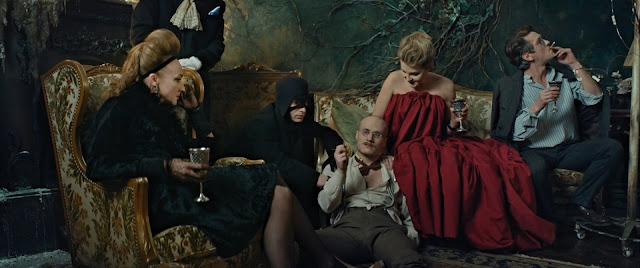“Happy families are all alike; every unhappy family is unhappy in its own way.” – claims Tolstoy in the first sentence of his masterpiece Anna Karenina, and Renata Litvinova goes to great surreal lengths in depicting peculiar misfortunes of a matriarchal family which her third and so far most compelling feature is centered around. Occupying the role of Margarita, the glamorous head of the Northern Clan, and doing so with great gusto and graceful mannerisms that she’s recognized for, she weaves an unorthodox story of love and death, with time frozen or flowing irregularly, and both Eros and Thanatos inebriated with confusion.
The thirteenth hour on a secret lunar clock in the Clan’s garden provides immortality or at least, slows down the aging process for Margarita, her eccentric relatives, and even their assistants and shadows who gather at the dinner table on New Year’s Eve, simply because no other days seem to exist in their luxurious mansion amidst a snow-covered tundra. After their only heir, Benedict (Anton Shagin), loses his beautiful fiancée, Fanny (Litvinova’s daughter Ulyana Dobrovskaya), in a plane crash, and reluctantly marries her sister, Faina (Sofya Ernst), the promise of a fairy tale breaks into smithereens, and misery gradually seeps in through the cracks of the increasingly decaying house and its surroundings...
Litvinova’s narrative plays out like a feverish Russian classic infected with the Groundhog Day virus, Beckettian absurd and Márquez-like magic realism, but if you’re familiar with her previous work, you will notice that it pretty much operates as a natural extension of her own twisted universe where life doesn’t necessarily have to end (and when it does, it becomes another declaration of cinema’s artifice). Some of the characters’ names return along with the recurring themes, as an over-the-top familial melodrama transforms into an equally theatrical neo-noir, whereby the film’s phantasmagorical nature and self-conscious quirks are left intact. The North Wind blows as if through a dream, one that bends at will and stays with you long after the awakening, which shouldn’t come as surprise, considering its fabulous costumes and opulent set design perfectly in tune with the vaguely defined setting of velvet-cloaked decadence wonderfully ‘painted’ by Oleg Lukichyov’s camera. An omnipresent sense of grandeur that is achieved right from the get-go is continually emphasized, with many devils residing in classy details, especially during a highly memorable scene which marries impressive soprano singing (of Hibla Gerzmava) to dark, Carpenter-esque synthwave.




No comments:
Post a Comment